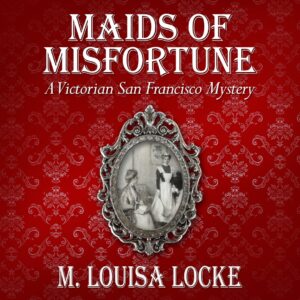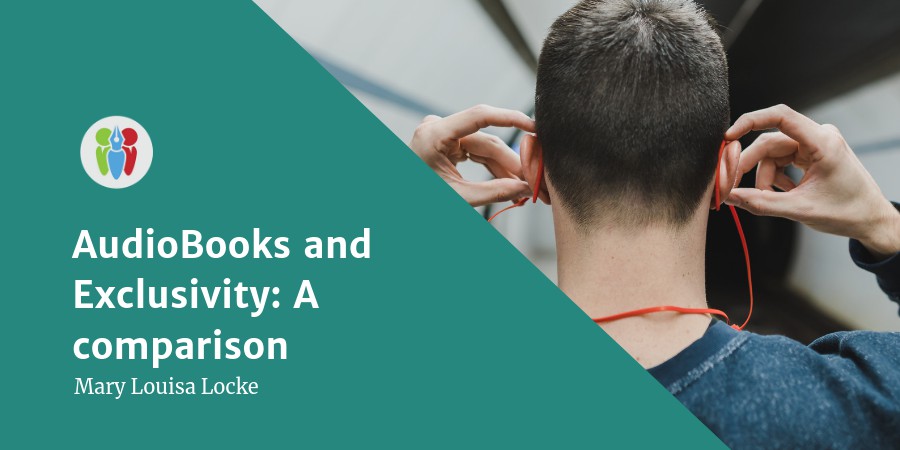With the rise of audiobook popularity, comes a familiar question: wide or exclusive? Still today, indie authors struggle with the decision over whether or not to publish their ebooks exclusively with Amazon’s KDP Select or “to go wide” by distributing them to additional retailers. In today's post, author member Mary Louisa Locke discusses audiobooks and exclusivity.

Mary Louisa Locke
I have found little discussion of these competing strategies when it comes to audiobooks. Given that audiobooks are the most rapidly expanding sector of the publishing industry, I believe it’s time for the discussion over wide or exclusive to begin in earnest.
In my own case, I recently shifted from publishing my audiobooks exclusively with ACX, the audiobook production and distribution arm of Amazon, so that I could “go wide” by distributing through Findaway Voices, a division of the audiobook distributor, Findaway. I hope that by sharing my reasons for making that shift, I will help other authors consider whether or not this strategy might hold promise for their own audiobooks.
ACX and Exclusivity:
As a pragmatist, I’ve always tried to determine what strategy will maximize the availability and visibility of my books, minimize the amount of time and money spent on production and marketing, and maintain the greatest flexibility so I can respond to changes in the industry. For my ebooks, sometimes this has meant going wide, sometimes going exclusive. Currently my Victorian San Francisco Mystery series is wide while my Paradisi Chronicles science fiction series is exclusive to KDP Select.
 In 2012, using the above criteria, I didn’t hesitate to go exclusive with ACX for the distribution of the audiobook version of Maids of Misfortune, the first book in my Victorian mystery series. Exclusivity was the only way I could use ACX’s royalty share option (splitting royalties 50/50 with a narrator so that I didn’t have to pay money upfront). That option was the best way for me to minimize the time and expense it would take to produce an audiobook while maximizing its availability and potential revenue since ACX distributed to Amazon, Audible and Apple Books, the dominant audiobook markets at that time.
In 2012, using the above criteria, I didn’t hesitate to go exclusive with ACX for the distribution of the audiobook version of Maids of Misfortune, the first book in my Victorian mystery series. Exclusivity was the only way I could use ACX’s royalty share option (splitting royalties 50/50 with a narrator so that I didn’t have to pay money upfront). That option was the best way for me to minimize the time and expense it would take to produce an audiobook while maximizing its availability and potential revenue since ACX distributed to Amazon, Audible and Apple Books, the dominant audiobook markets at that time.
I continued to sign exclusive contracts with ACX through 2017, even though I stopped using the royalty share option, because a non-exclusive contract would cut my royalties from 40% to 25%, and I had no reason to believe I would make up the loss of that revenue by selling my books elsewhere.
Non-exclusivity and Findaway Voices:
However, last summer, after hearing representatives from Findaway Voices speak at a NINC conference about the ways they differed from ACX, I decided to publish the audiobook editions of my new science fiction trilogy with ACX under non-exclusive contracts so I could experiment with distributing through Findaway Voices.
This spring I then shifted all but one of my Victorian mystery books (which was still under a royalty share option) from exclusive to non-exclusive status with ACX and published them with Findaway Voices.
I made this decision for the following reasons.
- Unlike ACX, Findaway Voices doesn’t lock you into a contract for seven years. Instead, you can take a book out of distribution with Findaway Voices or change in which stores your books will be distributed. I ran into real problems with ACX’s contract when I needed to replace one of my audiobooks with a new narrator and new edition. (My first choice of a narrator for this book hadn’t turned out well, and another benefit of Findaway Voices for authors is that they have a more curated process of matching authors and narrators than ACX has.)
- ACX had made several changes that began to undercut my revenue, weakening the benefits of exclusivity.
- Unlike ACX, Findaway Voices doesn’t require exclusivity in order to get a higher royalty rate. For instance, if you distribute to Apple Books through them, you get a 45% royalty rate (unlike the 40% rate you would get through an exclusive contract with ACX or the 25% you get with a non-exclusive ACX contract.)
- Audible no longer dominates the market in downloadable audiobooks. One recent survey found that listeners only used Audible 27% of the time, reflecting the success of retailers like Kobo, GooglePlay, and Playster to penetrate the market. Findaway Voices, currently distributing to over thirty stores, has done an excellent job tapping into the new global opportunities—for example, see their partnership with Storytel and AudiobooksNZ. So far, nine percent of my sales through Findaway Voices have been outside the US.
- Unlike ACX, Findaway Voices has partnerships with several of the companies that distribute to libraries—like Overdrive and Bilbliotheca. In fact, so far sales to libraries have been 58% of my unit sales and 29% of my revenue on Findaway Voices.
With traditional publishers actually making it more expensive for libraries to order digital books, I believe indie authors have a real opportunity to carve out a significant percentage of the growing audiobook library market—if they aren’t locked into exclusivity with ACX.
- Most importantly, Findaway Voices offers more tools for promotion than ACX, which ultimately is going to determine whether my sales outside of ACX are enough to compensate for the lower royalty rate under the non-exclusive contract with ACX or increase my overall revenue. These promotional tools, particularly the potential in their partnership with Chirp (the new audiobook promotion website that is being set up by the folks from BookBub) is ultimately what prompted me to speed up my timetable for shifting my Victorian Mysteries to non-exclusive ACX contracts and getting them uploaded to Findaway Voices (a process that only took about a month.)
This decision paid off when I was offered a chance to promote one of my books with Chirp. Findaway Voice’s promotional tools, including my experience promoting with Chirp, will be the focus of my ALLi blog later this month, so stay tuned.
OVER TO YOU
What do you think about audiobooks and exclusivity? Are your audiobooks wide or not? What are your reasons for that decision?
If you enjoyed this post, you might like these from the ALLi archive:





The government needs to get involved with these “exclusively” agreements. They should be illegal. That’s how companies monopolize market. Humans are free to decide where they want to go and leave; attempting to control that should be considered no different than the intent to abduct or kidnap people, except its done economically.
I have Book 3 in my Amish series with Findaway and have made very little. I only see sales to libraries. I had first two books in series with Spoken Realms because my narrator wanted to try them. I never liked SR I have now removed my books from there and in process to put them with ACX. I thought Findaway would be better than Spoken Realms but hasn’t been the case. I don’t know what I’ll do about Book 3 and Findaway yet.
Hello! Thank you for this article. I’m wondering with Findaway books, I’m not seeing anywhere for listeners to post reviews. I might have totally missed it, but where do you tell listeners to post reviews?
Thanks
I found this very interesting as I have (like any) been considering audiobooks for my work. I am probably going to use Findaway Voices, but through the Draft2Digital platform – which as far as I can tell makes things a bit easier, plus there’s no upfront fee for production. D2D already distribute ebooks and now paperbacks, and I’ve found the majority of my D2D sales are through Apple. D2D also distribute to Barnes and Noble, and Amazon, as well as Scribd, Biblioteca and others.
However, I should perhaps add, that going exclusive to Amazon at the end of last year with the majority of my books has given me a massive increase in sales through the pages read thing with Kindle Unlimited. After a number of years as a staunch ‘go wide’ author, I’m now reluctantly very happy with my royalties, even though I miss the Apple, Kobo, and Nook readers.
Am I the only one who finds they spend more time worry about what to do than actually writing?
I have used Findaway Voices and I have not seen a real return on investment. Although they offer higher royalties, the price you set for your books are not guaranteed. Bibliotheca is the bulk of where my downloads are purchased and they cut my set prices down 75% yielding a few cents for each book in royalties. I have not seen any books sold on any of the other retailers you mentioned above. Also Audible is still the highest retailer of audiobooks, so in my mind, it would be more beneficial to sell the audiobook where most are shopping, verses going wide with a hope that you’ll sell enough on other retailers that you may have gotten with ACX.
The use of Findaway’s promotional codes were ok, but listeners do not feel their platform is user friendly and opt not to use the promo codes. I think I’ll still with ACX. But thank you for your review.
Thank you for sharing. Very helpful.
Hi Mary,
Great article — and very timely for me as I prep for the launch of my first Indie audiobook. I was all set to use ACX/Audible when I noticed that unless I gave them 7 years exclusivity my royalties would be much lower. That nixed them for me as, as you point out, they no longer dominate the market.
I am experimenting now with a release in audio of “Ghost Busting Mystery,” Book 1 of my humorous southern cozy mystery series, The Shady Hoosier Detective Agency. As a promo and test I am releasing it serialized on Podbean — https://daisypettles.podeban.com — but still want to release it as a straight audio book, especially to library and bulk reading (subs) market. Your article helped me a lot as I’d not heard of FindAway.
I’ll likely use them now as I enter the audio book market.
Thanks! And keep writing. I enjoy your San Francisco series.
Daisy Pettles
https://www.daisypettles.com
What an extremely useful article, Mary Lou. Many thanks. It was just what I needed. JJ
I also experimented with Findaway when I had a new book to produce. I found their upcharge for letting them produce the book to be prohibitive, so I had my narrator record it via ACX under a nonexclusive contract. He then took the files that ACX had deemed acceptable and uploaded them to Findaway which avoided any fees.
As for marketing … meh. I’m only selling to libraries; Findaway does not have easy links to use for promo, nor do they tell you where your books are being sold, you have to dig that all out yourselves. Also, the price you set may or may not be the price the channel charges.
I’m trying their month-long promotion to see if that generates more sales, but so far, I’m not overly impressed.
Findaway is starting a royalty share option, but then you have to commit to 10 years with them.
Bottom line: a lot depends on what your narrator is willing to do.
Hit “send” too soon. I also did my own comparison: https://terryodell.com/producing-audiobooks-comparing-acx-and-findaway-voices/
I also did a comparison of ACX and Findaway based on my own experience. https://terryodell.com/producing-audiobooks-comparing-acx-and-findaway-voices/
Good feedback. Lots to consider.